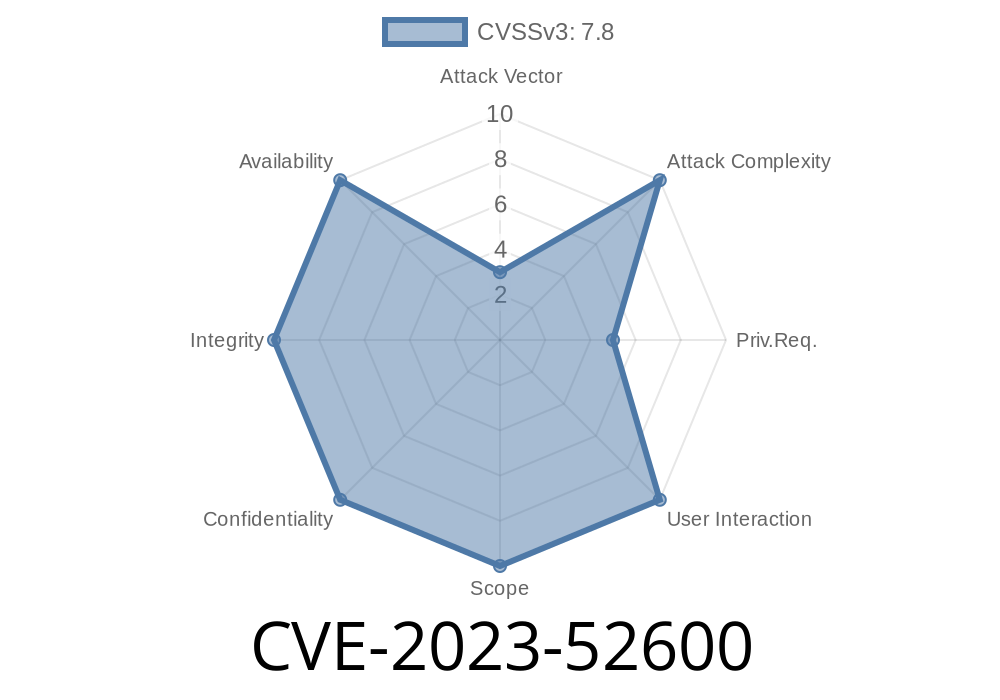---
Summary
In 2023, a critical use-after-free (UAF) vulnerability was discovered and patched in the Linux kernel’s JFS filesystem. Tracked as CVE-2023-52600, this bug could have led to system crashes or potentially allowed a local attacker to escalate privileges by exploiting memory corruption. In this long-read, we’ll break down what happened, how the vulnerability could be exploited, and show you code snippets from the affected kernel sources.
What Is JFS and Why Does This Matter?
JFS (Journaled File System) is one of several Linux filesystems, known for its robust journaling capabilities. Many enterprise and personal setups may use it. A bug in JFS, especially one like a use-after-free, is a serious concern because it opens the door for unintended behavior, including possible code execution in kernel space.
Cause: Mishandling of ipimap Freeing in jfs_evict_inode
The heart of this bug is in the jfs_evict_inode() function. When mounting special inodes using diMount(ipimap) fails, the kernel incorrectly continues to reference memory it just released. This so-called “use-after-free” allows attackers to manipulate memory or cause system crashes.
Subsequent accesses through that pointer trigger use-after-free behavior.
Why is this dangerous?
A user with local system access could potentially combine this with other bugs or clever heap management to escalate privileges, bypass security checks, or crash the entire machine.
Let’s look at the code (before the fix)
struct inode *ipimap = new_inode(sb);
if (!(rc = diMount(ipimap))) {
/* Problem: sbi->ipimap is set even if diMount fails! */
sbi->ipimap = ipimap;
} else {
/* ...error handling; but ipimap may still be referenced */
}
If diMount(ipimap) fails, ipimap may be released, but it's still pointed to by sbi->ipimap. Later use causes UAF.
The Fix
The correct logic is to only assign sbi->ipimap if we are sure diMount() succeeded. The patch looks like this:
struct inode *ipimap = new_inode(sb);
if (!(rc = diMount(ipimap))) {
sbi->ipimap = ipimap;
} else {
iput(ipimap); // Properly drop reference
}
Now, if diMount(ipimap) fails, we don’t assign ipimap to sbi->ipimap and we clean up properly.
Patch reference:
- Kernel commit
- Linux stable patch
Exploitation Details
While arbitrary code execution is non-trivial from this UAF alone, it could be abused by a local attacker. Here’s how an attacker might exploit the bug:
Error Trigger: Attacker crafts filesystem or mount options to force diMount() to fail.
3. Heap Layout: By stressing the kernel heap, attacker tries to occupy freed slot with controlled data.
4. Trigger UAF: Kernel later accesses sbi->ipimap, but that memory may now belong to some attacker-controlled object, possibly gaining further escalation or causing a crash (DoS).
Proof of concept skeleton (non-malicious)
# This is pseudo-code and won't work on its own
cmd = "mount -t jfs /dev/vulnerable /mnt/test -o specialoption"
# Intentionally cause a diMount failure (e.g., by corrupting the volume)
os.system(cmd)
# Trigger UAF by causing system to access jfs_evict_inode
It’s non-trivial to go further without kernel heap manipulation techniques. But in the world of kernel exploitation, one small mistake can often be chained with others for privilege escalation.
Who Is Affected?
- Linux Kernel: All versions before the patch in October 2023 are at risk
Update your kernel to at least the version containing the patch referenced above.
- Restrict local access: Only trusted users should be able to mount filesystems, and consider using SELinux/AppArmor to contain potential damage.
References
- Official CVE record (CVE-2023-52600)
- Linux Kernel commit
- LWN.net discussion
Conclusion
CVE-2023-52600 in JFS is a prime example of how intricate and dangerous use-after-free bugs can be in file system code. While the practical impact for most home users is limited, server admins and distribution maintainers should update fast. Always keep your kernel up to date to avoid these risks.
Timeline
Published on: 03/06/2024 07:15:10 UTC
Last modified on: 12/12/2024 17:36:42 UTC
